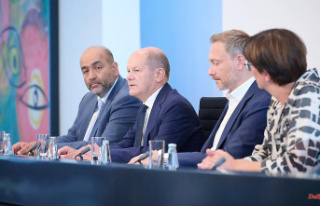The third relief package is in place - and is viewed mostly positively. The focus this time is actually on the needy, comments a large part of the German press. But there is also criticism: Above all, the financing is currently still on feet of clay.
The "Frankfurter Allgemeine Zeitung" considers the correction of omissions in the earlier relief packages with a view to pensioners and students to be sensible. Politically, "the many measures in the package ultimately all have the same goal: They are intended to preserve social peace in the country, which Putin wants to erode with his hybrid warfare. Because the pressure is so immense, the planned state interventions are also increasing, this time especially in In the case of gas, the coalition frankly admits that even the financially strong German state would no longer be able to compensate for all the price increases."
The third relief package is setting the right focus this time, the "Pforzheimer Zeitung" also comments. "It is right that this time the coalition is putting more emphasis on those who are most dependent on state support in the energy crisis. These are the needy, low earners, pensioners and students. That the pensioners with the last packages went away empty-handed was unfair and will now be made up for."
The "Straubinger Tagblatt" also considers the new relief package to be suitable for "cooling down excited minds and preventing a possible split in the country". The package is also politically exciting, writes the author. "While it recently seemed as if the SPD had fallen behind the Greens and FDP, the work on the relief has put the balance of power back in order: The third package contains a lot of red, a little less green and even less yellow."
According to the "Süddeutsche Zeitung", both junior partners have achieved negotiating successes. The Greens could "refer, among other things, to the participation of the federal government in a successor to the nine-euro ticket". Finance minister and FDP leader Christian Lindner could, in turn, "hold the debt brake that will come into effect again for the time being, but must also be responsible for a billion-euro bill that seems daring."
The "Neue Zürcher Zeitung" from Switzerland comments less positively on the results of the 22-hour negotiation marathon. "This package also tends towards the watering can principle. All pensioners and all students should receive one-off payments of 300 euros and 200 euros respectively. Even if the payment to the pensioners is subject to income tax and therefore those who receive lower pensions receive more net, both measures are not very accurate. After all, there are wealthy pensioners and students from well-heeled families who don't need handouts." The "Neue Osnabrücker Zeitung" also does not consider the package sufficient "to prevent a loss of prosperity for broad sections of the population as a result of the Ukraine war. At best, the crash will be cushioned. It is doubtful whether that will be enough to ensure social peace."
The "Hannoversche Allgemeine Zeitung" comments that the relief package means that the traffic light coalition is falling short of the expectations it raised itself. "The resolutions should be 'massive' and 'precise'. A volume of 65 billion euros is massive, no question, but the aid is anything but precise, especially in the areas where most people have the greatest concerns: gas prices and Cost of living. For days it was debated whether a basic gas requirement should be calculated and a price cap set on top of it. Now a commission of experts is to clarify 'promptly' 'whether and, if so, how such a model can be implemented in Germany or Europe'. It will take time. "
The "Berliner Zeitung" also appreciates that some projects "should be of help to many people in the country". However, the financing is anything but clear. "In fact, the federal government only contributes around half of the money with 32 billion euros. A supplementary budget is not planned, the debt brake should be observed in the coming year."
There is still plenty of material for debate, writes the "Stuttgarter Zeitung". The relief package is neither a panacea nor the conclusion of the crisis management. Despite all the criticism, however, "the new federal government, despite its heterogeneous composition, is once again proving to be amazingly capable of taking action".












